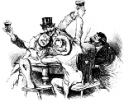Beer and skittles
Make mine coffee and pizza.
Dear Word Detective: “Sam’s parking fine payments keep the city in beer and skittles.” In my hearing, this expression has always referred to a payment, usually onerous or unfair, for a second party’s benefit. Can you tell me from whence it comes and why? — Janet.
That’s an interesting question. But before we begin, I should warn you that there are people out there, who someday you may have the misfortune of encountering, who will castigate you for using the phrase “from whence.” They will point out that “whence” all by itself means “from where,” and insist that “from whence” must therefore mean “from from where,” which, if they were correct, would be awkward and redundant. But they are not correct, and “whence” and “from whence” are equally proper.

Whee.
Onward. The example you provided of “beer and skittles” certainly does reek of unjust enrichment, as the lawyers say, but I think you may be carrying a bit too much of that context into judging the connotation of “beer and skittles.” It is entirely possible to enjoy “beer and skittles” without bilking anyone. It used to be possible, for instance, for a factory worker to look forward, after a life of toil, to a retirement of carefree enjoyment of “beer and skittles.”
As an idiom common in English since at least the early 19th century, “beer and skittles” means “unalloyed enjoyment and relaxation,” what we might also call “living on easy street.” Unfortunately, such a state of bliss is uncommon, and it shows in the history of the phrase. The first recorded use of “beer and skittles” in print is in Charles Dickens’ “Pickwick Papers” in 1837, where it is used straightforwardly to describe a comfortable state (“It’s a reg’lar holiday to them — all porter and skittles”) (“Porter” is short for “porter’s ale,” a strong dark beer.)
But the remaining citations for “beer and skittles” listed in the Oxford English Dictionary, and the vast majority of examples to be found today, employ the phrase as a symbol of precisely what life is not “about” (“‘Teach him life can’t be all beer and skittles,’ said Robert Gardner maliciously,” Agatha Christie, 1931). The phrase “life isn’t all beer and skittles,” often deployed as a stern admonition to wayward youth, is considered a tattered cliche today but remains nonetheless enormously popular, probably because life stubbornly refuses to get any easier.
One interesting aspect of “beer and skittles” is that the phrase is often used, especially in the US, by people who haven’t the faintest idea what a “skittle” is. There is, of course, a brand of candy called Skittles, but the “skittles” in “beer and skittles” is a game often played in pubs in Britain, a kind of tabletop bowling in which the pins are called “skittles.” The word “skittle” itself dates back to the 17th century and is of uncertain origin, but appears to have Scandinavian roots.
Page 1 of 2 | Next page
